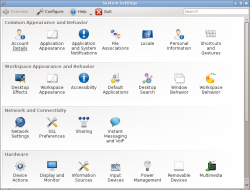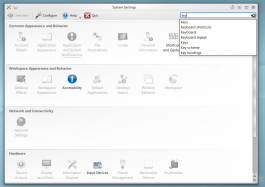System Settings/pt-br: Difference between revisions
MarcusGama (talk | contribs) Created page with "Dispositivos de entrada" |
MarcusGama (talk | contribs) Created page with "Configura seu teclado, mouse e joystick." |
||
| Line 39: | Line 39: | ||
|colspan="2"|<h4>[[Special:myLanguage/System Settings/Input Devices|Dispositivos de entrada]]</h4> | |colspan="2"|<h4>[[Special:myLanguage/System Settings/Input Devices|Dispositivos de entrada]]</h4> | ||
|- | |- | ||
|[[Image:Preferences-desktop-peripherals.png|48px|link=Special:myLanguage/System Settings/Input Devices]]|| | |[[Image:Preferences-desktop-peripherals.png|48px|link=Special:myLanguage/System Settings/Input Devices]]||Configura seu teclado, mouse e joystick. | ||
|} | |} | ||
Revision as of 20:09, 14 November 2010
Template:I18n/Language Navigation Bar
Funcionalidades
- Centro de controle para as configurações globais da plataforma KDE
- Personaliza e gerencia seu computador em um único local conveniente
- Função de pesquisa auxilia a reduzir as configurações prováveis
Pesquisa
As Configurações do sistema possui uma função de procura para auxiliá-lo na busca de uma configuração. Basta digitar uma palavra-chave no campo de procura na barra de ferramentas e as Configurações do sistema exibirão os módulos que contém a palavra-chave, ocultando os que não a possuem. Os módulos das Configurações do sistema também pode ser pesquisados através do KRunner.
Categorias
Aparência e comportamento comuns
Detalhes da conta

Configura suas informações de usuário, senha e caminhos. Você pode também configurar seus fornecedores de Área de Trabalho Social. Aparência dos aplicativos

Configura o estilo, cores, ícones, fontes e ícones emotivos de seus aplicativos.
Hardware
Dispositivos de entrada

Configura seu teclado, mouse e joystick.
System Administration
Login Screen

Configure the login manager (KDM). Startup and Shutdown

Configure your system behavior when starting up or shutting down.
Mouse Gestures
- KDE SC version 4.4.4
The place where you start is ""
Enabling mouse gestures
In the bottom left corner of the window there is a button. Make sure that the checkbox is checked. Set the timout as you see fit. The mouse button might be different for you, I chose 3 for using the right mouse button. If you want input actions to be enabled automatically, check the "Start the input Actions daemon on login" above.
Creating the Mouse gestures actions group
Right click on the left pane (in an empty area under the list of action groups) and choose , rename that group to "Mouse Gestures" and check the checkbox attached to its name.
Creating a new mouse gesture
From now on I will assume that the new group is called "Mouse Gestures". Right click on and choose (here there are three options but I didn't manage to work with "Send Keyboard Input") using "Command/URL" or "D-Bus Command" you will need to create a gesture and bind an action to it.
To create the gesture
Click on your and select the tab. in the bottom of the screen there is an button (click it). In the box that just opened draw your gesture using the left mouse button.
To bind an action
if you chose simply enter that command/url under the tab at the field.
Examples using Command/URL
Close window
This command will let you close the next window you mouse click on.
Command/URL: wmctrl -c :SELECT:
to close the active window
Command/URL: wmctrl -c :ACTIVE:
Translate clipboard content
This command will display a translation of the current clipboard content.
- Required for this are:
- xclip
- libtranslate
Command/URL: kdialog --title "Translation" --msgbox "`xclip -o | translate -f en -t he -`"
Replace 'en' and 'he' with the desired source and destination language, if you are not sure, a full list of language codes is available from the ISO 639-2 list.
Examples using D-Bus
If you chose D-Bus, here are few examples.
Finding out what to fill where, is done with the help of the "Launch D-Bus Browser", using that browser you can find what method you wish to call in what application object. Using D-Bus we need to fill some fields, the field name will be regular and the content italic.
Runner
This will display the Runner dialog.
Remote Application: org.kde.krunner
Remote Object: /App
Function: org.kde.krunner.App.display
Audacious next/previous/pause/play/stop/repeat track
Remote Application: org.mpris.audacious
Remote Object: /Player
Function: org.freedesktop.MediaPlayer.Next (replace Next with Prev/Pause/Stop/Play/Repeat)
Audacious PlayPause track
If not playing will play, if playing will pause.
Remote Application: org.mpris.audacious
Remote Object: /org/atheme/audacious
Function: org.atheme.audacious.PlayPause
display the actions pop-up. (I am using that to search and translate words)
Remote Application: org.kde.klipper
Remote Object: /klipper
Function: org.kde.klipper.klipper.showKlipperManuallyInvokeActionMenu



